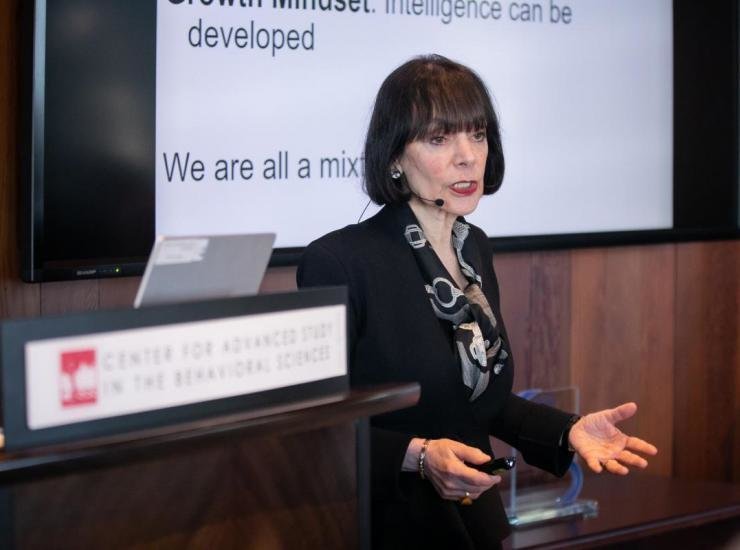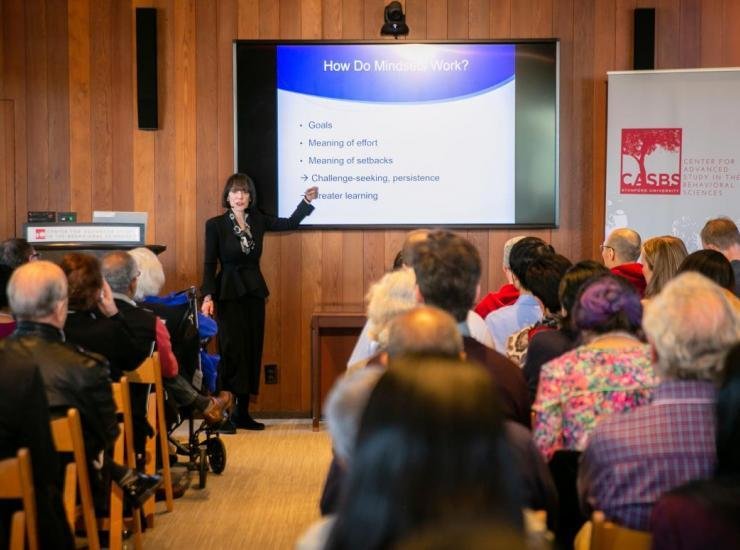Dweck Outlines New Directions of Mindset Research in SAGE-CASBS Award Lecture
A capacity crowd gathered to listen to one of the most influential social science scholars of the past three decades. In honoring what she called the “beautiful concept” of human potential, that scholar gave the crowd something well worth listening to.
It came in the form of the 2019 SAGE-CASBS Award lecture, delivered by the award’s winner, Carol Dweck, the Lewis & Virginia Eaton Professor of Psychology at Stanford University, on March 14 at the Center for Advanced Study in the Behavioral Sciences (CASBS) at Stanford. CASBS, in partnership with SAGE Publishing, announced Dweck as winner of the fifth SAGE-CASBS Award in October 2018.
Established in 2013, the SAGE-CASBS Award recognizes outstanding achievement in the behavioral and social sciences that advance our understanding of pressing societal issues. It underscores the role of the social and behavioral sciences in enriching and enhancing public policy and good governance. Past winners of the award include psychologist and Nobel laureate Daniel Kahneman, sociologist and education rights activist Pedro Noguera, political scientist and former U.S. Census Bureau director Kenneth Prewitt, and William Julius Wilson, the eminent sociologist of poverty, inequality, and race.
As CASBS director Margaret Levi noted in her introduction, Dweck is renowned for the study of motivations and self-conceptions that guide human behavior, and specifically for her pioneering body of work on mindsets – implicit theories of intelligence that people possess. Her pioneering research on the fixed and growth mindsets – beliefs that abilities are carved in stone and immutable, as opposed to the belief that abilities can be developed – has shaped both scientific and public discourse, the latter in large part through her acclaimed 2006 book Mindset: The Psychology of Success.
"Thanks to Carol Dweck's foundational and continuing research, mindset science will remain a growing field that exerts a profound on people's lives – including empowerment to overcome achievement inequalities – for some time to come."
-Margaret Levi
CASBS director
Dweck’s award lecture, “Mindset: Toward A New Perspective on Motivation and Human Potential,” reflects a career – still going strong – devoted to understanding how to help people retain or regain the innate drive for learning. In the first part of the lecture, she provided an overview of foundational mindset research and its principles. In short, mindsets predict learning, especially in the face of challenges. They “create different psychological worlds for people” and ignite or dampen their motivations to learn as well as orient them toward different goals. This has been shown over and over in both experimental and real-world settings. For example, as recently as 2016, Dweck and collaborators, surveying all 10th grade students in Chile (a sample of more than 160,000 people), found that those exhibiting a growth mindset perform better than those with a fixed mindset. This held at all income levels but was more pronounced at the lower end of the income distribution.
Mindsets, as Dweck acknowledged, are certainly not the silver bullet answer to the pernicious problem of poverty. But the results compelled her to wonder if a growth mindset may be less available in some settings and can be one way in which poverty or inequality is perpetuated. That led to the question of whether one can intervene and teach students a growth mindset and, if so, will they benefit from it. A number of growth mindset intervention studies, as Dweck reviewed for the audience, have shown that the answer clearly is yes. The brain can be developed like a muscle.
The initial interventions she referenced, however, were very costly on a per-student basis. One prominent study entailed eight one-on-one sessions with each student in a modest sample, with trained counselors receiving instructions from researchers before and after the sessions, thus consuming even more time. Such an approach is just not cost effective at larger scales, which is the point if one wants to impact many lives and help reduce educational inequalities.
This brought Dweck to the next section of her award lecture, which introduced, as she called it, a “wacky, possibly foolhardy, idea that CASBS believed in.” It revolved around a simple question: Is it possible to introduce a growth mindset intervention to a large nationwide sample of students in a way that elevates their motivation and achievement and is potentially scalable?
The wacky idea – attributed by Dweck mostly to one of her former doctoral students, David Yeager – was a mindset intervention distilled to less than one hour and delivered over the internet to a nationally representative sample of American high school freshman.

A formidable undertaking. How did Yeager, with collaboration from Dweck and a group of other mindset scientists pull-off what eventually became the National Study of Learning Mindsets?
Beginning in 2013, the coalescing group, in conjunction with former Stanford research and teaching affiliate Ellen Konar, converged at CASBS for a series of meetings. The Center served as the research base for planning and operationalizing the National Study. CASBS nurtured the project as it evolved and as the group formally constituted itself as the Mindset Scholars Network in 2015. In 2014-15, Yeager was one of two CASBS fellows funded by the network, while Dweck served as a CASBS consulting scholar. The thriving network spun-off into a freestanding organization in 2017.
In her award lecture, Dweck praised and credited CASBS for its pivotal role in the network’s founding, and for “gestating, delivering to fruition the National Study.”
CASBS also, as Dweck noted, helped the network become more interdisciplinary.
“We were a bunch of psychologists…but the input from sociologists, economists, statisticians, and so forth, were vital.”
Read here about “CASBS and Mindset Scholars: Pushing the Frontiers of Mindset Science”
The National Study of Learning Mindsets is a double-blind, randomized experiment with a nationally representative sample of 83 high schools and more than 14,000 ninth-grade students. Work on that study is a “prime example,” as Dweck wrote in 2017, “of a rigorous scientific process that tries to understand when to expect and when not to expect mindset intervention effects.”
In the past 18 months or so, National Study data have been collected, aggregated, analyzed, and characterized in article form. So what are the findings?
“I’m not allowed to tell you,” Dweck teased the audience. “It’s under review at a big journal now…”
In a very general way, though, she shared that the intervention had the desired effect on the overall grade point average of the lower achievers in the national sample who were in the growth mindset group compared with the control group. Moreover, one year after the intervention students with a growth mindset took more advanced math courses at a higher rate. Finally, in terms of explaining what helped the growth mindset take root, Dweck, one of several coauthors of the paper in question (David Yeager is the lead author), allowed herself only to hint at the role of peer norms in school. Stay tuned for more…
The final section of Dweck’s lecture focused on two frontiers pushing mindset science. First, she emphasized to the audience that mindsets are not only things we carry around in our individual heads; in addition, there are mindsets that permeate contexts. As one example, do some disciplines collectively embody a more fixed mindset than others? She revealed recent research by others showing in disciplines that commonly attribute success to (relatively fixed) intelligence and aptitude that cannot be developed further – STEM fields are the prime offender, though not the only – fewer women and African Americans earn PhDs.
She also cited a 2019 publication by another former doctoral student, Mary Murphy (a 2015-16 CASBS fellow supported by the Mindset Scholars Network), and her collaborators, showing that the achievement gap between underrepresented minorities and whites narrows substantially if their STEM-field professors hold growth mindsets. The study comprises a sample of 150 STEM professors and more than 15,000 students.

Not everything depends on individual achievement. Mindsets can influence group effort toward common goals. And indeed, more new research (forthcoming in 2019) by Murphy, Dweck, 2017-18 CASBS fellow Laura Kray, and other collaborators draws from a sample of Fortune 500 firms and shows that growth mindset organizations create cultures of greater employee empowerment, diversity of people and ideas, integrity, and teamwork. In contrast, companies that assume a rather fixed “culture of genius” witness more cheating, cutting of corners, and individuals using whatever means to get ahead. Generally speaking, organizational mindsets are thought to exert influence on the norms, practices, and policies companies put in place.
The National Study of Learning Mindsets, it should be noted, also is looking at contexts in terms of schools as organizations.
As work on organizational mindsets advances, Dweck noted that she and many of her collaborators seek to at least partially replace the “lone view” of human achievement with one where each person is “embedded in and contributing to the organizations and societies they inhabit…interlocking pieces of a larger puzzle,” she said.
The second frontier involves neuroscience. Dweck and collaborators currently are studying structures in the limbic system that coordinate and evaluate signals from all over the brain. They are investigating how these neural circuits create motivation, make decisions, and send them to the prefrontal cortex for action. The researchers seek to identify potential “mindset neural circuits” and, specifically, “growth mindset circuits” that can help enhance learning “or even play a role in the promotion and maintenance of neural plasticity for important learning,” as Dweck put it.
What about critical neural circuits that, for all practical purposes, have closed? Neuroscientists now are able to reopen them through genetic or psycho-pharmacological manipulation. But there is also evidence that this can be accomplished through intense interest, motivation, and practice. Can growth mindset and circuits “primed” by a growth mindset play a role in reopening and maintaining neural plasticity throughout life?
Dweck’s quest is to find out. In so doing, she said, she “hopes to supplement the traditional view of a pure static intelligence that’s sitting in the cortex with a much more dynamic intelligence that thrives on the growth mindset kind of motivation.”
In this scenario, according to Carol Dweck, human potential then becomes “a dynamic, growing attribute arising from motivated brains and used by humanity to move the world forward, to move it forward toward common goals.”
Further reading
- "Carol Dweck Recipient of SAGE-CASBS Award"
- "CASBS and Mindset Scholars: Pushing the Frontiers of Mindset Science"
- SAGE-CASBS Award web page
